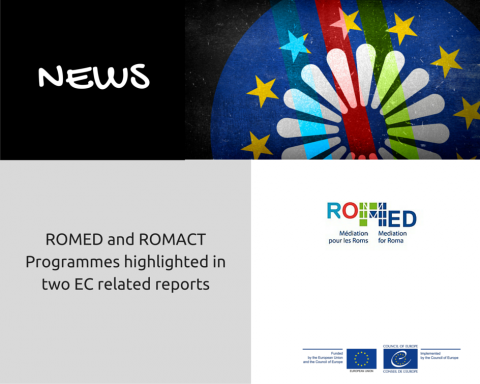ROMED and ROMACT Programmes highlighted in two European Commission related reports
During the past week two reports were issued by the European Commission (EC) or to the attention of the EC, in which the ROMED and ROMACT joint programmes are highlighted as initiatives of importance for the capacity building and cooperation with communities and local authorities.
On 27 June 2016, the EC issued a Communication to the other EU institutions on the assessment of the implementation of National Roma Integration Strategies. It reports on the overall conclusions regarding progress in implementing the EU Framework and reviews, for the first time, Roma integration measures put in place under the EU Council Recommendation. An accompanying Staff Working Document presents a country–by-country assessment, and highlights examples of practices in the various thematic areas. According to its communication, one of the key priorities of the EC remains to “support the capacity building of local authorities and civil society in order to promote their active mobilization”. The ROMED and ROMACT Programmes are presented under the chapter on building capacity and promoting cooperation, as joint programmes of the EU and Council of Europe investing "in mediation, structured dialogue and capacity building of Roma communities and local authorities".
A Special Report of the European Court of Auditors released on 28 June 2016 found that while the European Commission has made significant progress in setting out policy initiatives to promote Roma integration, obstacles and dilemmas remain and additional efforts are required at both Commission and Member State level. The auditors underlined that “the effectiveness of policies is enhanced with the involvement of Roma people at every stage of the process”. It further explains that “Roma involvement must take place at both national and European levels through the input of expertise from Roma experts and civil servants, as well as by consultation with a range of Roma stakeholders in the design, implementation and evaluation of policy initiatives. It is of vital importance that inclusion policies are based on openness and transparency and tackle difficult or taboo subjects in an appropriate and effective manner. Support for the full participation of Roma people in public life, stimulation of their active citizenship and development of their human resources are also essential.”
Furthermore the latter report emphasises the fruitful cooperation between the European Commission and the Council of Europe, particularly through Joint Programmes such as ROMED and ROMACT: "To increase the effectiveness of its work in the field of Roma integration, the Commission has also since 2011 worked more closely with the Council of Europe, an organisation with a great deal of experience in this area (see paragraph 13). In particular, the Commission has participated in meetings organised by the secretariat of the Council of Europe and in certain joint programmes with the Council of Europe."

